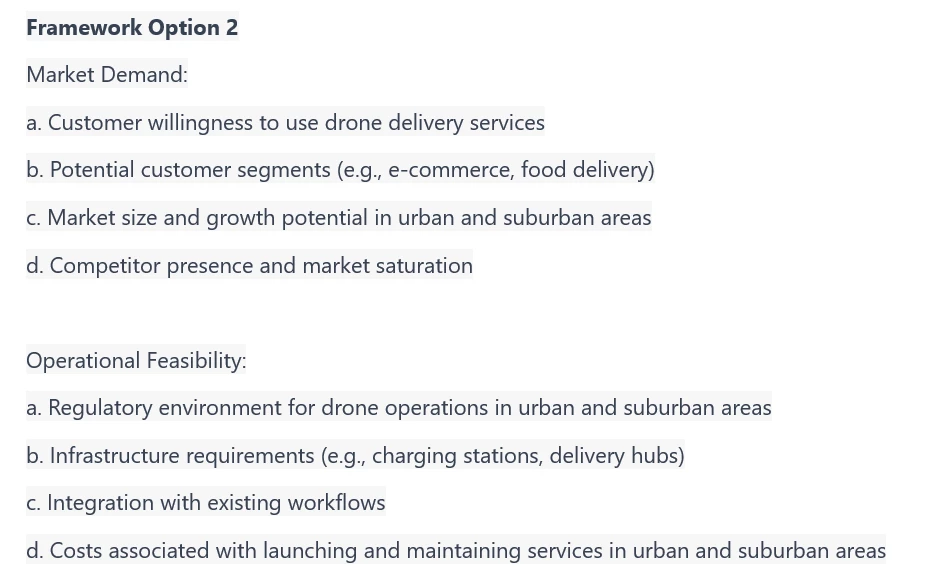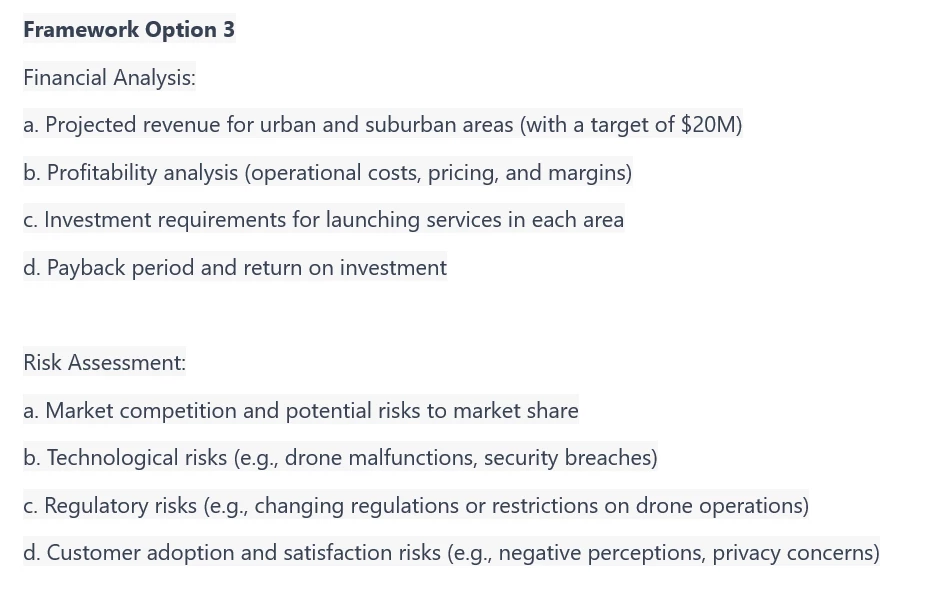Based on Bain 1st Round Case (2023): Last Mile Delivery
A startup company specializing in last mile delivery with drones is determined to reach $20M in revenue while also becoming profitable. The company's innovation lies in leveraging drone technology to revolutionize the logistics sector, specifically focusing on last-mile delivery, which accounts for a significant portion of shipping costs. However, the firm has to overcome numerous challenges including technological, regulatory, and logistical issues associated with both urban and rural environments.
As the next strategic step, the company is considering pilot launches in two different environments - city and suburb - and is uncertain about which option to choose. You have been engaged to evaluate these options, considering the profitability, revenue potential, and strategic implications of each, and provide a recommendation to the company's leadership team.
Sample Structure
Clarifying Questions and Answers
Question: What specific drone technology is the company using for last mile delivery?
Answer: The company is using proprietary drone technology, designed specifically for the challenges of last-mile delivery.
Question: What are the company's specific objectives with the pilot launch in terms of metrics or KPIs?
Answer: The company wants to choose the most profitable option in the long term.
Question: What is the company's financial standing? Will it be able to support the costs associated with the pilot program?
Answer: The company has secured adequate funding for the pilot program and has plans in place for further fundraising based on the results of the pilot.
Question: Are there any regulatory restrictions or legal issues that the company should be aware of in relation to drone operations in city and suburb environments?
Answer: The regulations for drone operations can vary by city, state, and country. The company has a legal team in place to handle regulatory compliance, but this is definitely a major consideration in choosing the pilot location.









This is a REAL Bain case. This case is based on a 1st round Consultant Bain interview in the U.S. in the spring of 2023.
Every single question in this case was asked during the interview. You may be surprised to see how many questions there are, but this candidate was indeed asked this many during the case interview.
This particular case was also interviewer-led.
Scoring Criteria: Use the following grading system for each skill area:
a. Structured Thinking (Frameworking):
1 = Lacked a coherent structure
5 = Pinpointed the appropriate issue, segmented it into a complete set of non-overlapping components (e.g., MECE), presented a plan to tackle the case, and offered valuable insights.
b. Numeracy/Math:
1 = Committed numerous errors and required assistance in setting up equations
5 = Performed calculations accurately and with confidence, identified implications, designed a clear and efficient approach, and demonstrated exceptional speed.
c. Judgement and Insights (Charts & Exhibits): 1 = Missed basic insights 5 = Connected findings to develop practical recommendations, made reasonable hypotheses, shared impressive insights, and flagged far-reaching implications.
1 = Overlooked fundamental insights
5 = Linked observations to devise actionable recommendations, formulated plausible hypotheses, conveyed strong, objective-driven insights, and highlighted impact.
d. Case Leadership (unless interviewer-led):
1 = Frequently disoriented and dependent on guidance
5 = Advanced autonomously and maintained focus on the question and the client's objective.
e. Creativity:
1 = Had difficulty generating original ideas
5 = Offered a variety of strong and diverse ideas, tailored to the industry and business context.
f. Presence:
1 = Not client-ready
5 = Exhibited professionalism, charisma, enthusiasm, and self-assurance.
g. Communication:
1 = Unclear and disorganized
5 = Demonstrated active listening, spoke precisely, and communicated concisely.
h. Synthesis (Final Recommendation):
1 = Failed to provide a coherent and well-founded recommendation
5 = Justified recommendation with key considerations, potential risks, and subsequent steps to address those risks.
During the Interview: As the candidate progresses through the case, take notes on their performance in each skill area. Be prepared to provide feedback at the end of the interview.
Post-Interview: After the interview, grade the candidate's performance in each skill area based on your notes and the scoring criteria. Share the scores and any specific feedback with the candidate to help them understand their level of readiness for the actual interview.
Improvement: Encourage the candidate to focus on areas where their performance was weak and provide guidance on how they can improve in those areas.